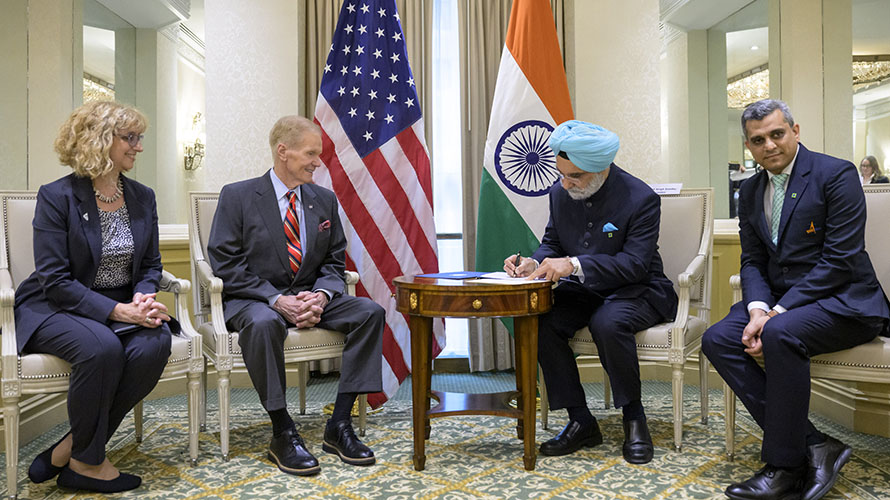As the 27th Nation to Sign the Accords, India Brings Significant Scientific and Industrial Strengths to the Moon Program
Image: Indian Ambassador Taranjit Sandhu signs the Artemis Accords, as US Deputy Assistant Secretary for India Nancy Jackson, left, NASA Administrator Bill Nelson, and ISRO Space Counsellor, Krunal Joshi, look on. Credit: NASA/Bill Ingalls.
On June 21, 2023, the Republic of India became the 27th partner nation to sign onto the Artemis Accords, the U.S.-led international framework to help guide humanity’s return to the lunar surface and create a lasting presence there. The National Space Society (NSS), which has chapters and hosts STEM activities in India, congratulates the country for joining the group of nations committed to a safe and peaceful return to the Moon, this time to stay.
“NSS is very pleased to see India join with the U.S. and the international community for this great endeavor,” said Anita Gale, NSS CEO. “We have had NSS chapters in India for many years, and additionally run our International Space Settlement Competitions for thousands of students in India. They are a welcome partner in the community of nations joining hands for this exciting journey to benefit all humanity.”
Participating in the signing on behalf of the government of the United States were NASA Administrator Bill Nelson, State Department Office of Space Affairs Director Valda Vikmanis-Keller, Deputy Assistant Secretary Nancy Jackson of the State Department’s Bureau of South and Central Asian Affairs, Associate Administrator Karen Feldstein for International and Interagency Relations at NASA, Director Sean Wilson of the National Space Council’s International Space Policy, and Assistant Director Matthew Daniels of the White House Office of Science and Technology Policy.
Ambassador to the United States for India Taranjit Singh Sandhu signed for the Republic of India, which occurred shortly before President Biden met with Indian Prime Minister Narendra Modi for high-level talks.
Vice President of NSS-India Relationships and NSS Board member Madhu Thangavelu stated: “India is leading the way for other developing economies to join hands in humanity’s expansion into the solar system. The upcoming NASA-ISRO Synthetic Aperture Radar(NISAR) spacecraft is the largest and most advanced spacecraft payload of its kind and will launch in early 2024. NASA is also hoping to welcome an Indian Vyomnaut (astronaut) onboard the International Space Station next year. The NSS India chapters have worked long and hard to promote the exploration and development of space in their home country, and we could not be more proud of their efforts.”
NSS Executive Vice President Hoyt Davidson added, “Twenty years from now, we will look back at this as an extremely important event establishing the Artemis team of countries as the long-term leaders in space.”
India has long demonstrated its acumen in space, aggressively targeting exploration beyond Earth orbit. It’s Chandrayaan 1 lunar orbiter discovered water on the Moon, and in 2014 the country became the fourth spacefaring power to successfully send an orbiting probe to Mars. In 2024, India plans to launch its first crewed spacecraft into orbit. These are just a few of the country’s major space achievements.
The Artemis Accords, which are grounded in the Outer Space Treaty of 1967, are a set of non-legally binding principles to guide sustainable civil space exploration. These principles, which include transparency, peaceful purposes, space resources, registering of space objects, and release of scientific data, help make the space environment safer and more predictable, and allow all nations – even those without space programs – to benefit from the scientific data obtained in space.




















1 thought on “The National Space Society Congratulates India on Signing of the Artemis Accords”
Nashik India chapter of national space society NSS has been the vibrant chapter devoted to the educational and career opportunities in space technology, space exploration and awareness of space